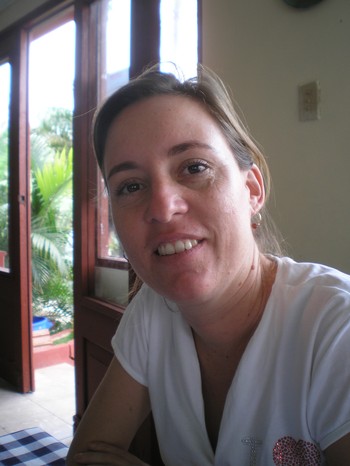In addition to the communications skills she is developing as a fourth-year student at Seminario Evangelico Teologia (Evangelical Theological Seminary, or SET) here, Marielys Cabrera Leal is getting lots of first-hand experience. The Presbyterian pastor-to-be is current president of the SET student body.
“My responsibilities are essentially to know and deal with the needs of students and to serve as liaison between students, faculty and administrators,” she said in a Jan. 30 interview with Presbyterian News Service. “The main requirement, I think, is to have good communication skills and to deal with all sides.”
SET students don’t just have to pay attention to academics. All students have what Cabrera calls “a double function”—each Friday after morning classes they fan out across the island to serve out the weekend in congregations. “If they are not careful, they can become preoccupied with their work responsibilities,” she says of her schoolmates.
Unlike theological students in the United State, church employment after graduation—the residential program leading to ordination as a pastor is five years—is not an issue, says Cabrera, “especially for the Presbyterian students. We still have so many churches without pastors.”
But the whole idea of being a pastor in Cuba “is not easy,” she adds. “Ministry is not a favorable vocation in Cuba. We have to work a lot on the theme of vocation.”
In addition, Cabrera continues, “the candidacy process is very long and arduous.” Candidates must serve a one-year internship before entering seminary. Cuba’s denominations are stricter than the seminary in accepting students. “Once the denomination approves, it is very rare for the seminary to say ‘No,’” she said.
Cabrera’s life has been leading up to ordination as a Presbyterian pastor since she was a 16-year-old in Villa Clara in central Cuba. “I worked as a lay leader but hadn’t really thought about becoming a pastor, but through more work and study I began to think more seriously about it. It was when I continued to see so many needs in my community that I became convinced to become a pastor.”
SET “has lots of possibilities,” Cabrera says. A first-rate faculty and library as well as other academic facilities means “that every student has the opportunity to excel.” She particularly appreciates “the tendency of professors to be easier or tougher depending on students’ level of interest.”
The toughest SET courses? Easy, Cabrera says: “Hebrew and Greek.”
Another benefit of SET is its ecumenical and international student body. That helps make daily chapel services an important part of campus life. “Chapel is an important part of our spiritual formation,” Cabrera says, adding with a smile: “Of course, the Presbyterian students are most apt to attend every day.”
Seminario Evangelico Teologia “is a great school—not just as a theological school but as a place where we learn to live together,” Cabrera said. “It’s not always easy, but we learn about other denominations, other countries and we all learn to love the communities where we work.”

